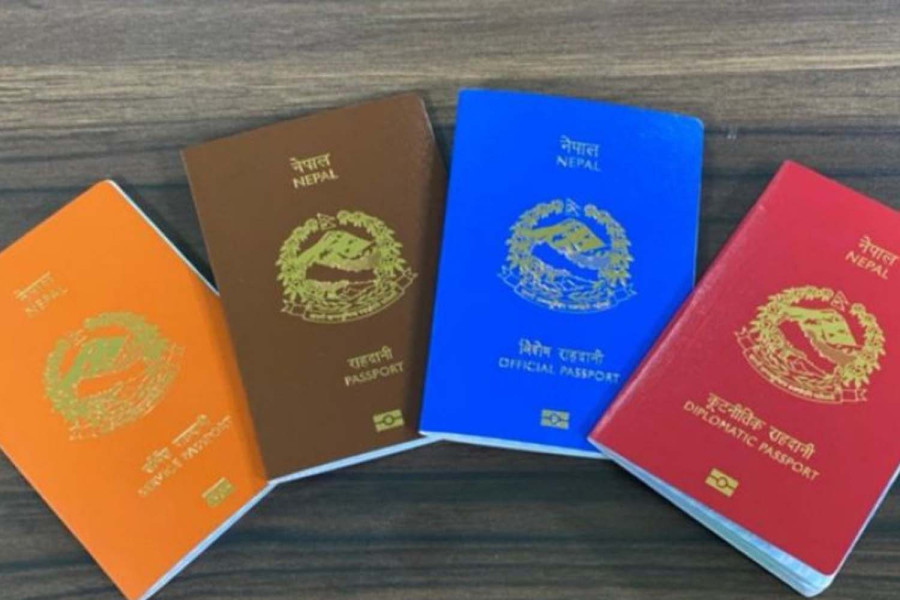National
Pair of German firms invited to sign new passport deal
New procurement process involves printing and delivery of 6.4 million biometric passports, starting in 8 months.
Anil Giri
The Department of Passports has invited two German companies to sign a new passport deal to print and supply 6.4 million biometric passports or e-passports.
After the Public Procurement Review Committee cleared the deck, the department, under the aegis of the Ministry of Foreign Affairs, on Tuesday issued Notification of Letter of Acceptance to the two German companies—Veridos GmbH and Muehlbauer ID Service. With this, the dominance of the French company, IDEMIA, at DoP has come to an end, as the German companies will take over the responsibility of supplying the secure e-passports to Nepali citizens.
“We have issued the notifications to the two German companies—Mühlbauer for work under package one and Veridos for work under package one and invited them to sign the contract,” Tirtha Raj Aryal, director general at the Department of Passports, told the Post. “We have issued the notification to both companies on Tuesday by giving a deadline of 15 days.”
After the department issued a letter of intent to the German-based companies, the IDEMIA, which has been providing machine readable passports and biometric passports to Nepal since 2010, filed a complaint against the decision. But the department decided in favour of the two German companies and invalidated the claims by IDEMIA. Then the IDEMIA reached out to the Public Procurement Review Committee (PPRC) under the Public Procurement Monitoring Office (PPMO).
The committee rejected IDEMIA’s claims, ruling that its demands were not valid. Following this, the department sent letters to the two German companies, giving them 15 days to sign the contract for printing 6.4 million passports.
The PPRC, which is a semi-judicial body involving experts, gave a go-ahead to the department for signing the passport deal with the two German companies.
On June 6, the department had issued letters of intent to award the two contract packages to the pair of Germany-based companies.
Earlier, the IDEMIA was responsible for supplying the entire system including pre-enrolment, enrolment, data management, and delivery, supply of the booklet, personalisation, quality control, and packaging. This time the department disintegrated the tender and called for two separate bids for installation of the system, pre-enrolment and enrolment and data management in one package and supply of the booklet, personalisation, quality control, and packaging in the second.
Mühlbauer won the first package while Veridos won the second bid. With this, the dispute over the selection of companies for passport printing has been resolved.
As the new procurement process begins, the stock of passports is depleting fast and is now below 400,000, according to Aryal. The new contractors have eight months to supply the new passports. In this case, the DoP must keep buying passports from the old vendor, through the variation order, until new contractors start delivering the passports.
The IDEMIA is out of the race and has already supplied the passports it agreed to. But if the government must fill the passport copy shortfall, it can buy passports from the same vendor for a certain amount and a certain period—and this process is called the variation order.
The Cabinet must give its nod for the procurement of passports through variation orders.
On an average, the DoP distributes 100,000 passports a month through the department as well as all 77 districts and even other service centres and from Nepali missions outside the country.
“We will tell the new bidders to supply the passports at the earliest. As per the contract provision, they have eight months to deliver. But we also cannot stop distribution of passports until they provide the first batch of passports. So, if we run out of stock, we will have to buy through the variation order,” said Aryal.
This will not be a choice but a compulsion, he added.
Since 2010, the year Nepal adopted machine-readable passports and scrapped hand-written ones, the IDEMIA has been providing both MRP as well as e-passport or biometric passports. The biometric passport has been in use only since 2022. Since 2010, the IDEMIA has printed and supplied over 10.53 million passports to the department.
This time, five international security printing companies had submitted bids for Nepal’s multi billion-rupee passport contract. The winning bidder would be tasked with supplying 6.4 million passports over five years.




 8.22°C Kathmandu
8.22°C Kathmandu














